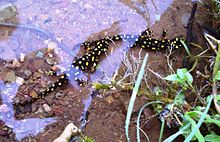Kurdistan newt
| Kurdistan newt | |
|---|---|

| |
| Neurergus derjugini in Kavat stream, near Ravansar city, Kermansah province, Rojhalat. | |
| Scientific classification | |
| Domain: | Eukaryota |
| Kingdom: | Animalia |
| Phylum: | Chordata |
| Class: | Amphibia |
| Order: | Urodela |
| Family: | Salamandridae |
| Genus: | Neurergus |
| Species: | N. derjugini
|
| Binomial name | |
| Neurergus derjugini (Nesterov, 1916)
| |
| Synonyms[2] | |
| |
Neurergus derjugini, the Kurdistan newt,[3] Kordestan newt, Derjugin's (Kordestan) mountain newt, or yellow-spotted mountain newt, is a species of salamander in the family Salamandridae.[1][2] It is found in Kurdistan in western Iran[3][1][2] and in northeastern Iraq.[3][2][4][5] There are two subspecies, Neurergus derjugini derjugini and Neurergus derjugini microspilotus,[2][4][5] the latter is sometimes known as the Avroman Dagh newt.[2]
Taxonomy
[edit]The species was first described by Pyotr Nesterov in 1916 based on a population in the Surkev Mountains. He described a second population from the Avroman region as a subspecies microspilotus which varied in the number of yellow spots and the spots being more circular. The two have been considered subspecies and only show minor differences in their mitochondrial DNA sequences and slightly more prominent differences in a nuclear gene sequence.[4][5]
Etymology
[edit]The species name derjugini commemorates the collector Konstantin Deryugin.
Habitat and conservation
[edit]Neurergus derjugini occurs in small streams at elevations of 1,300–1,865 m (4,265–6,119 ft) above sea level.[1][5] It is threatened by droughts, water extraction, pollution, and collection for pet trade.[1] It is known from a small number of populations, most of them very small.[4] Climate change is going to reduce the habitable areas for this species.[3]
References
[edit]- ^ a b c d e Sharifi, M.; Shafiei Bafti, S.; Papenfuss, T.; Anderson, S.; Kuzmin, S.; Rastegar-Pouyani, N. (2016) [errata version of 2009 assessment]. "Neurergus microspilotus". IUCN Red List of Threatened Species. 2009: e.T59451A86642381. doi:10.2305/IUCN.UK.2009.RLTS.T59451A11944058.en. Retrieved 9 January 2023.
- ^ a b c d e f Frost, Darrel R. (2022). "Neurergus derjugini (Nesterov, 1916)". Amphibian Species of the World: An Online Reference. Version 6.1. American Museum of Natural History. doi:10.5531/db.vz.0001. Retrieved 9 January 2023.
- ^ a b c d Khwarahm, Nabaz R.; Ararat, Korsh; Qader, Sarchil; Sabir, Dana Khdr (2021-07-01). "Modeling the distribution of the Near Eastern fire salamander (Salamandra infraimmaculata) and Kurdistan newt (Neurergus derjugini) under current and future climate conditions in Iraq". Ecological Informatics. 63: 101309. Bibcode:2021EcInf..6301309K. doi:10.1016/j.ecoinf.2021.101309. ISSN 1574-9541.
- ^ a b c d Zarei, Fatah; Hosseini, S.N.; Amini, S.S.; Pezeshk, J.; Soofi, M.; Esmaeili, H.R. (2017). "A new locality of Kurdistan newt, Neurergus derjugini derjugini (Nesterov, 1916) represents a large population in Iran: Implication for conservation". Herpetology Notes. 10: 611–614.
- ^ a b c d Mawloudi, Shahriar; Rastegar-Pouyani, Nasrullah; Rastegar-Pouyani, Eskandar (2019-04-16). "Four new localities for the endangered Kurdistan newt Neurergus derjugini (Nesterov, 1916) (Amphibia: Salamandridae) in Kermanshah Province, Western Iran". Russian Journal of Herpetology. 26 (4): 235–241. doi:10.30906/1026-2296-2019-26-4-235-241.

